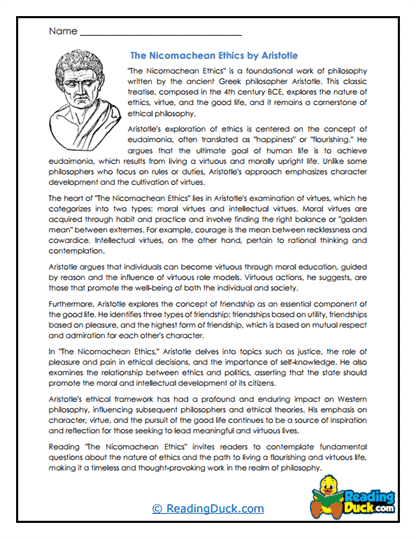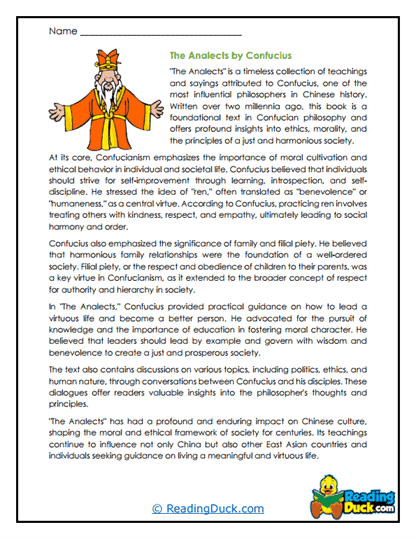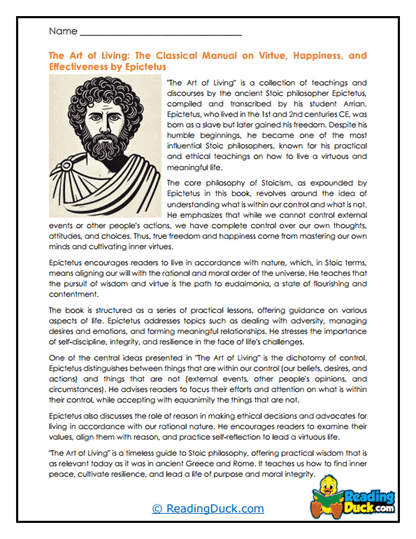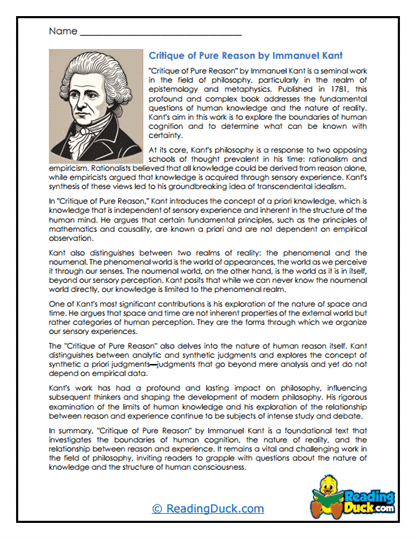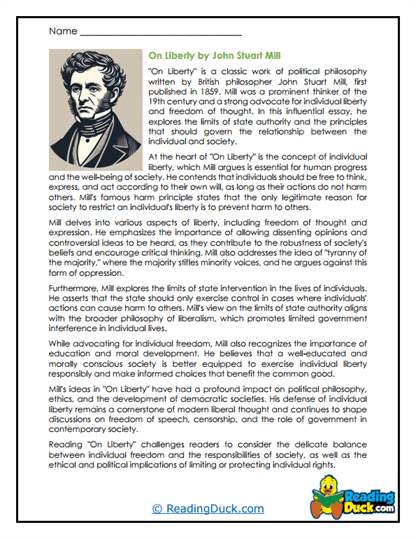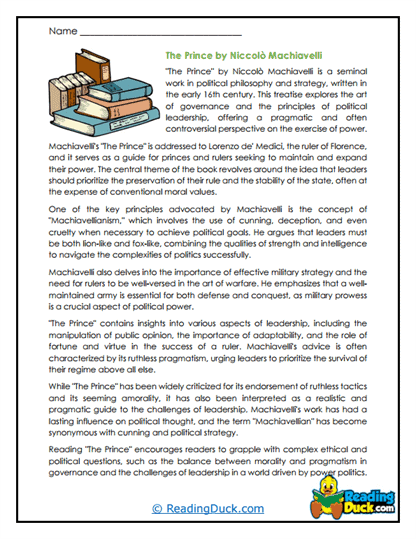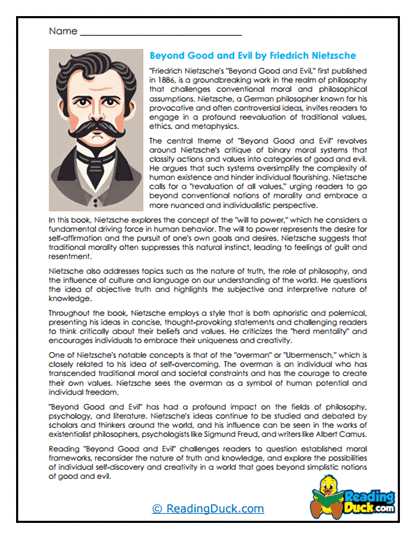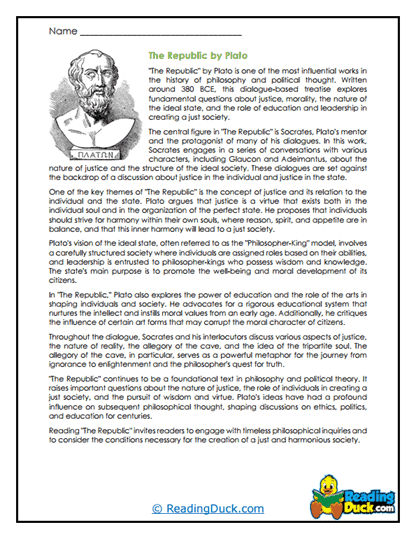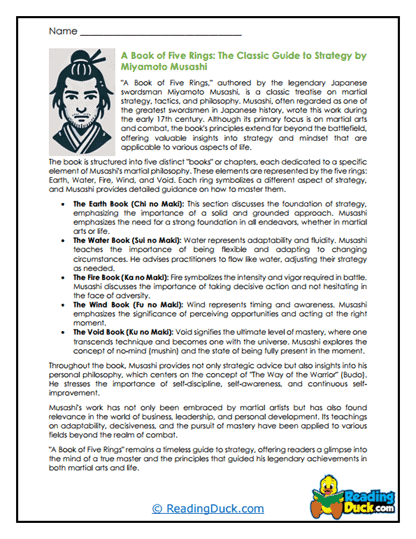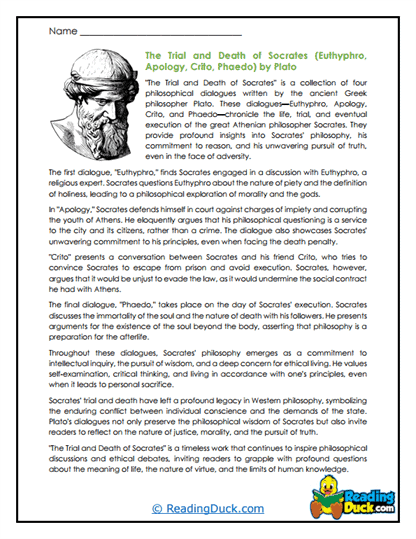Philosophy Worksheets
About Our Philosophy Worksheets
Our Philosophy Worksheets are designed to guide students through the rich and complex world of philosophical thought. Each worksheet set features a carefully selected philosophy-based reading passage, accompanied by multiple-choice questions, short answer prompts, and open-ended response questions that encourage deeper engagement with the material. These worksheets aim to help students explore profound ideas about existence, ethics, knowledge, and the human experience, all while enhancing their critical thinking, reading comprehension, and analytical skills.
Presented in PDF format, these worksheets are simple to download, view, and print, providing flexibility for both in-classroom and independent learning. Each worksheet includes a downloadable answer key, making grading and assessment quick and efficient for educators. Whether used in philosophy, social studies, or literature classes, these worksheets are a valuable tool for fostering intellectual curiosity and philosophical inquiry.
Understanding the Philosophy Genre
Philosophy as a genre deals with fundamental questions about life, the nature of reality, human existence, morality, and knowledge. From the works of ancient philosophers like Plato and Aristotle to modern thinkers like Descartes, Kant, and Sartre, philosophy asks students to engage with abstract concepts and ethical dilemmas that challenge their perceptions of the world.
The key themes in philosophy include:
- Metaphysics: The study of existence and the nature of reality.
- Epistemology: The theory of knowledge, asking questions like, "What can we know?" and "How do we know it?"
- Ethics: The exploration of moral principles, investigating what is right and wrong.
- Logic: The principles of valid reasoning and argumentation.
- Aesthetics: The study of beauty, art, and taste.
Philosophy is crucial to nonfiction because it teaches students to think critically about the world around them. It encourages them to explore big ideas, question assumptions, and engage in reasoned debate. In the context of education, philosophy helps students gain deeper insights into real-world issues, such as the nature of justice, the role of government, the ethics of technology, and personal moral responsibility.
Our Philosophy Worksheets offer students structured passages and questions that invite them to reflect on these complex topics. By encountering philosophical ideas in a guided format, students can begin to understand how philosophy is applied to daily life and significant global discussions, fostering intellectual growth and personal development.
Building Key Analytical Skills Through Philosophy
The Philosophy Worksheets are specifically designed to enhance students’ genre-specific skills such as reasoning, argumentation, and ethical thinking. Each worksheet encourages students to engage deeply with philosophical texts, helping them break down complex arguments and consider multiple perspectives.
Here are some key ways the worksheets support skill development:
- Reading comprehension: Students are challenged to understand dense, abstract material. The multiple-choice questions ensure they grasp the central ideas and arguments of the passage.
- Critical thinking: Short answer prompts push students to analyze the structure of arguments, identify logical fallacies, and evaluate the soundness of reasoning.
- Creative expression: Open-ended response questions encourage students to explore their own thoughts and beliefs in response to the philosophical ideas presented, fostering both creative and reflective thinking.
For example, a passage on utilitarianism might ask students to evaluate whether the "greatest good for the greatest number" is always the best approach to ethical decision-making. By considering real-life applications, such as in politics or healthcare, students are encouraged to apply philosophical principles to contemporary issues, making the subject matter both engaging and relevant.
Supporting English Language Learners (ELL) with Philosophy
Our Philosophy Worksheets are adaptable for English Language Learners (ELL), providing an opportunity for these students to practice their reading and writing skills while engaging with thought-provoking content. Philosophy can be challenging due to its abstract nature, but the structured format of our worksheets makes it more accessible.
Here’s how the worksheets benefit ELL students:
- Vocabulary development: Philosophy introduces specific terminology, such as "epistemology," "metaphysics," and "ethics." The worksheets encourage vocabulary growth by providing definitions and contextual usage, helping ELL students grasp both philosophical and academic language.
- Reading support: The passages are selected and structured to ensure clarity, even when dealing with complex ideas. Multiple-choice and short-answer questions help ELL students focus on key concepts, while open-ended questions encourage them to articulate their thoughts, improving language fluency.
- Cultural and intellectual engagement: Philosophical ideas often transcend cultural barriers. By introducing ELL students to universal questions about life, morality, and knowledge, these worksheets can inspire meaningful reflection and dialogue, regardless of language proficiency.
The downloadable answer keys also assist teachers in providing feedback that is specific to the needs of ELL students, ensuring they can successfully engage with the material and improve their comprehension and writing skills.
Connecting Philosophy Across Academic Disciplines
Philosophy is a highly interdisciplinary field, making it an excellent way to integrate content from various academic subjects such as history, science, and social studies. Our Philosophy Worksheets help students see the connections between philosophical ideas and other areas of study, promoting a more holistic learning experience.
- History: Many philosophical texts are historically significant, helping students understand the development of ideas over time. A worksheet on John Locke’s philosophy, for example, could be paired with lessons on the Enlightenment or the founding principles of modern democracy.
- Science: Philosophy often intersects with scientific inquiry, especially in areas such as ethics of technology, artificial intelligence, or the nature of consciousness. By analyzing philosophical arguments about scientific progress, students can explore the ethical implications of technological advancements.
- Social studies: Philosophy and social studies naturally align when discussing topics such as political theory, justice, and human rights. For instance, a passage on social contract theory could lead to discussions about the role of government, individual freedoms, and civic responsibility.
These cross-disciplinary connections help students understand that philosophy is not an isolated field but one that influences and is influenced by other domains of human knowledge. The Philosophy Worksheets encourage students to apply philosophical thinking across multiple subjects, deepening their understanding and appreciation of both philosophy and other academic disciplines.
Enhancing Literacy Programs with Philosophy
Philosophical texts, with their emphasis on argumentation and deep inquiry, can play a significant role in literacy programs aimed at improving critical reading and writing skills. Our Philosophy Worksheets support these programs by providing a structured format for engaging with nonfiction texts and encouraging clear, evidence-based writing.
Here’s how the worksheets contribute to literacy development:
- Critical reading: Students are trained to break down dense texts, identify the main arguments, and critically evaluate the author’s reasoning. This enhances their ability to read nonfiction texts more carefully and analytically.
- Evidence-based writing: The open-ended questions require students to respond to philosophical arguments with their own reasoning, supporting their claims with evidence from the text. This reinforces the importance of constructing well-supported arguments in writing.
- Discussion and debate: Philosophy is inherently dialogical, encouraging students to engage in discussions and debates about the material. These discussions help students practice articulating their thoughts and defending their viewpoints, further improving their literacy and communication skills.
By integrating these worksheets into literacy programs, educators can help students develop a nuanced understanding of nonfiction texts while also improving their ability to think critically and write persuasively.
Encouraging Deep Reflection and Personal Engagement
Philosophy invites students to grapple with life’s biggest questions, making it a powerful tool for fostering personal reflection and intellectual growth. Our Philosophy Worksheets include questions that encourage students to form their own interpretations of philosophical ideas and apply them to their own lives.
- Personal connections: Philosophy deals with questions about existence, morality, and the nature of knowledge—issues that are deeply personal and often provoke self-reflection. The open-ended questions on our worksheets ask students to reflect on how these ideas resonate with their own beliefs and experiences.
- Developing independent thought: Philosophy encourages students to question assumptions and explore different perspectives. Our worksheets help them practice forming and expressing their own views, promoting intellectual independence and curiosity.
- Building empathy and open-mindedness: Engaging with diverse philosophical perspectives teaches students to appreciate viewpoints that differ from their own. This fosters empathy and tolerance, qualities that are essential for navigating today’s diverse and interconnected world.
For example, a passage on ethics might prompt students to reflect on a moral dilemma they have faced, asking them to articulate how they resolved it and whether their decision aligns with the philosophical principles discussed in the text. This reflective process not only deepens students' understanding of philosophy but also makes the material more personally meaningful and engaging.
Conclusion
Our Philosophy Worksheets provide a comprehensive and engaging resource for exploring one of the most intellectually challenging and rewarding nonfiction genres. Through a combination of reading comprehension, critical thinking, and reflective writing exercises, these worksheets help students delve into the profound questions of existence, morality, and knowledge.
Adaptable for English Language Learners and easily integrated into cross-disciplinary studies, the Philosophy Worksheets foster a holistic learning experience that links philosophy to other academic fields. Whether used as part of a literacy program or as a standalone resource, these worksheets are invaluable for developing students’ analytical and reasoning skills.
With reflective, opinion-based questions, the worksheets encourage students to make personal connections with the material, ensuring that their study of philosophy is not only academically enriching but also personally meaningful.
